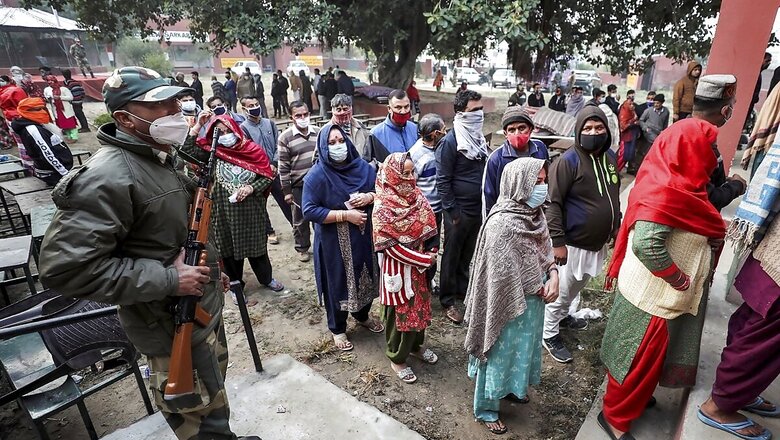
views
The union territory of Jammu and Kashmir remains in a time warp. Nothing illustrates this so graphically as the recently concluded District Development Council (DDC) elections. The fault lines lie firmly etched on the social and religious landscape of the region.
Each side claims victory and vindication of its agenda, but the people feel a sense of déjà vu. The BJP harks at largest number of seats won by a political party (75), but has won majority in 5 DDCs mostly from the hardcore Hindu dominated areas of Jammu, namely Jammu, Kathua, Samba, Udhampur and also in Doda. Similarly, People’s Alliance for Gupkar Declaration (PAGD) prides itself in capturing 9 DDCs in Kashmir and managing 3 in Jammu with the help of Congress – all from Muslim dominated regions.
The political arithmetic has emboldened the PAGD to reiterate its oft-repeated and tiring message that the result should be seen as a referendum on the status of J&K and Article 370. The BJP sees the same result as a triumph of democracy and clear assertion of support to the abrogation of Article 370. The truth remains that it is the victory of the people who wanted to move on with their daily lives, exercising their franchise in the hope that the democratic process will usher in better administration and development for bettering their lives. The shrill pitch of Mehbooba Mufti’s anti-Centre tirade over Art 370 and special status fetched her no gains but a much-reduced number of seats.
Free participation of voters in the elections is also a clear signal to Pakistan and the anti-national elements, about J&K people’s firm resolve to sort out their issues within the framework of Indian Constitution.
The future of the DDCs will largely depend on the attitude of the political parties and the central government. If the PAGD continues to harp on the special status and Art 370, they will lose out. Art 370, over the years, had anyway been diluted and the status of J&K is a temporary exercise for testing waters. The PAGD needs to move ahead and mobilise its cadres to focus on economic issues. Agitations for roads, jobs and development would fetch them more political capital than the autonomy issue which has lost sheen and is tiring the rest of India. The BJP also, instead of trumpeting its victory, should reflect on its failure to make an impression in the Valley and make efforts to make DDCs a workable model of development in its area.
The Zila Parishads and the Panchayat system in the country have had a mixed record. While model Panchayats have often come to notice, the system does not find much favour with the legislators. Zila Parishad chiefs and members also seek more administrative and financial powers and have strained relationship with the CEOs who are district revenue officers. J&K DDCs have a special place since unlike the Zila Parishads, members are directly elected. Their claim therefore for more powers will be an issue for the UT administration to contend with. A cash strapped J&K can hardly meet the demands of the newly elected members, in the form of offices, vehicles, security etc.
On paper, DDC is engaged with the very important task of overseeing district development projects and functioning as the district planning board, but in reality, there is nothing much at hand as all the decisions are taken by the CEO. It is up to the administration to keep them engaged in a positive manner and involve them with the schemes, in the true spirit of bottom-up planning. A clearer roadmap is also required regarding their actual functioning
The central government will have to seriously think of ways to bridge the continuing divide between Jammu and Kashmir. Creation of UT, hinting at attempts to rule from Delhi, has clearly upset the populace from both the regions. The first signal towards reconciliation and integration of J&K with the rest of India would be to again accord the status of a State, like in the rest of India, and hold elections to legislative assembly as soon as possible.
Lastly, the security paradigm cannot be ignored. Attempts to disrupt the election process from across the border were nipped in the bud by the security forces. Successful encounters and detection of terrorist modules enabled a smooth conduct of elections. Terrorist incidents are on an all-time low. But the soft targets are easy to prey upon and the 278 newly elected members of DDCs will certainly be on the radar of anti-national elements. A well-thought-out security cover will have to be laid out for the members to function without fear or favour.
The DDC elections can herald a new era of growth and peace, bailing the people out of gloom and despair. Governor J&K has started well and he needs to build on that. He should ensure that DDCs start functioning in right earnest by the time durbar shifts back to Srinagar. Let the capital adorn its age-old beauty, charm and grace enticing the visitors to a new period of peace and tranquility.
Read all the Latest News, Breaking News and Coronavirus News here




















Comments
0 comment